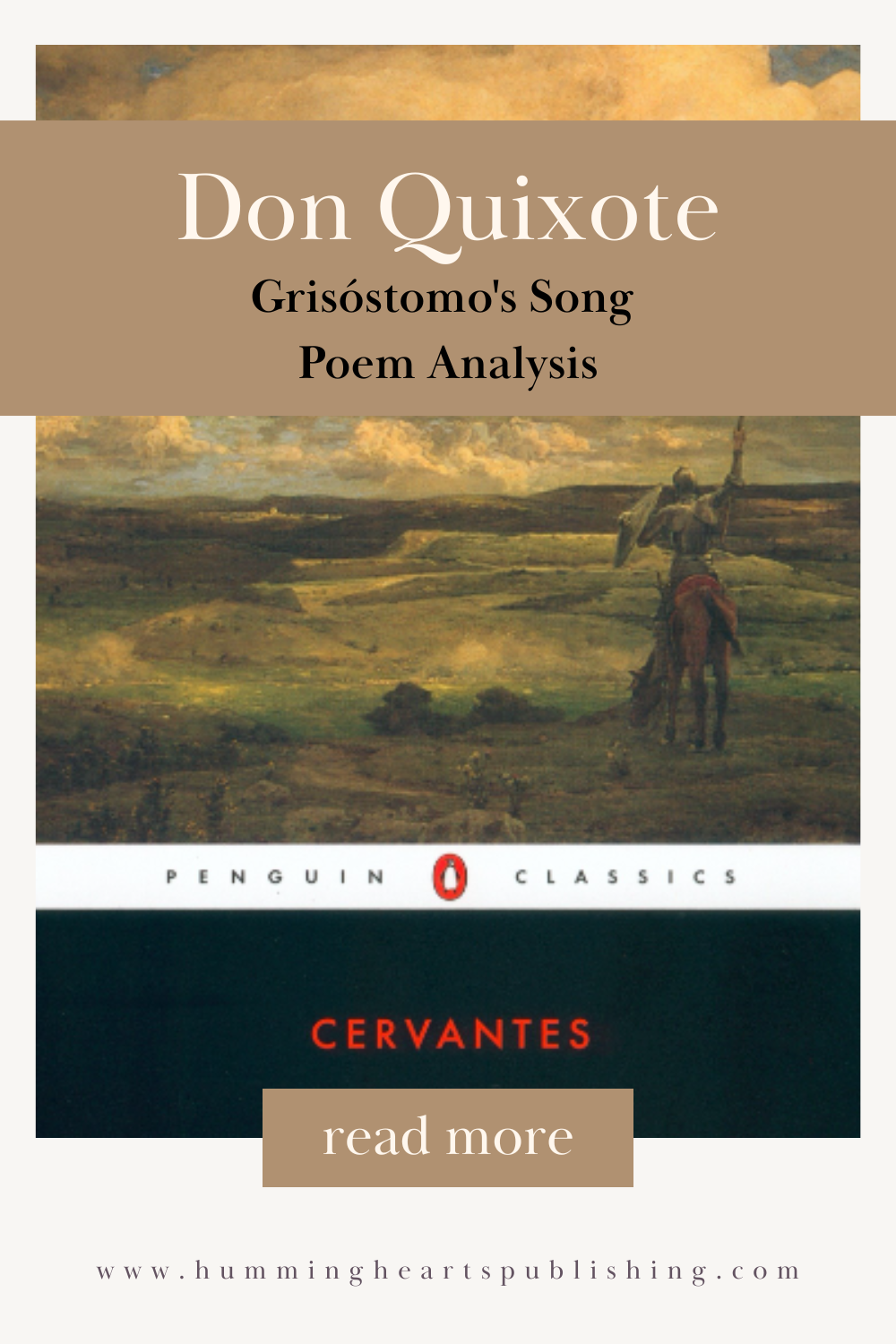Don Quixote: Grisóstomo's Song Poem Analysis
During the first quarter in The Quarterly Book Club, we read The Ingenious Hidalgo Don Quixote of La Mancha parts one and two by Miguel de Cervantes Saavedra, and there is so much to unpack with this book. This is an in-depth analysis of ego and love in Grisóstomo's Song poem.
About the Author:
Miguel de Cervantes Saavedra lived from 1547 to 1616; he was a storyteller, soldier, captive, slave, and criminal. Cervantes was initially a flop and suffered throughout his life upon mostly bad luck, which you can equate to his famous character Sancho Panza in his revered piece, “Don Quixote.” The book was released into two parts and was published in 1605 when he was fifty-eight. Cervantes explored will, stories, life, chivalry, and humility through his epic character Don Quixote. Cervantes is still admired by many for this masterful piece.
Disclaimer: This post may include affiliate links. If you purchase through my link, I will receive a small commission at no additional cost to you. See my full disclosure policy, here.
For Context
Let me present a brief backstory...
This song is Grisóstomo suicide note; he k*lled himself because of a woman's rejection.
Grisóstomo wanted it read to the people, including the beautiful woman who rejected him, Marcela. So, the townspeople and other passersby's, including Don Quixote and Sancho Panza, gathered around his funeral listening to the tragedy.
Don Quixote, Miguel De Cervantes Saavedra, Penguin Classics (February 15, 2003)
In-depth analysis of ego and love in Gristosomo's Song poem
Rejection
Initially, Grisóstomo fumed with hatred and anger towards Marcela because she refused to be with him.
While Grisóstomo lived, Marcela wouldn’t adhere to his requests and demands for love. So once the people heard the blasphemous remarks against her, Marcela appeared to advocate for her defense. She told everyone why his love was shallow and one-sided, born out of infatuation and selfishness.
Driven by his human desire, Grisóstomo misplaced infatuation for love. Marcela wanted a marriage to withstand beauty's temporary nature; she had many suitors like Grisóstomo, so what made him different from the rest? Since her uncle permitted marriage at will (which was liberal considering that time period), she chose not to marry - at least not to anyone she encountered.
Marcella felt attacked by Grisóstomo’s suicide because he portrayed her as a villain. Her beauty captivated many suitors; it became a plague.
Ego vs Love
Torn between his feelings of disdain and jealousy for Marcela, as the poem progressed, Grisóstomo's words grew callous. His language spat like fireballs — destructive and deadly. Proving her point in initially, that his desire was born out of infatuation.
Grisóstomo assumed Marcela would [finally] hear his words. He believed he claimed the final victory by vilifying her through his death.
His ego pushed him to suicide; he was ashamed and humiliated by her rejection. Had she agreed to be his wife — Grisóstomo would be alive, so it’s her fault he k*lled himself.
His words influenced the people, and they grew furious by Marcela's actions towards Grisóstomo. They believed she was egotistical and prideful because of her beauty, so Marcela appeared at his funeral, demanding they listen to her side of the story.
Grisóstomo’s SOng: Meaning and Interpretations of the poem
Ultimately Grisóstomo wanted to be loved; he believed that since Marcela didn’t love him - he was unlovable. As humans, we crave love - we need it. But there was a prideful, selfish, and egotistical side to his affection living inside of him; he wanted her to regret refusing him by killing himself.
Despite his chosen fate, I noticed a shift in Grisóstomo's tone and reflection on the situation as the song concluded. He believed in love again and accepted that it was worth the pain.
Grisóstomo's Song is a cautionary tale regarding infatuation.
There is no foundation in romance when it's based on one feeling: beauty. For Grisóstomo, his affection for Marcela fell easily defeated because it wasn't deep, and he didn't actually love her as a person. To assemble love, you need honesty, joy, sadness, sexuality, anger, peace, laughter, and trust to flourish and sustain two people.
Thank you or sticking to the end of Grisóstomo's Song poem analysis!
Tell us what this poem makes you feel in the comments below.


